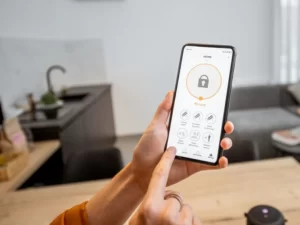Choosing the right smart home hub is essential to creating a smart home environment that works well and doesn’t cause problems. The main command center of a smart home is the hub, which connects all of the smart devices so that they work together and coordinate their functionality. There are many hubs to choose from, so when choosing the one that suits your needs, you should consider a few key factors that will affect how well it works, its compatibility and its ease of use.
1. Understanding the Role of a Smart Home Hub
The smart home center is the brain of the system. It uses different transmission protocols to connect to different smart devices, such as lights, thermostats, locks, and sensors. The hub makes it easier for these devices to communicate with each other so that they can work together to automate work and make life at home easier. It often works with mobile apps too, so that people can control their smart home from anywhere using their phone or tablet.
2. Ease of Setup and Use
When choosing a smart home hub, ease of installation and use is important. Look for a hub that is easy to set up and has clear instructions. Many hubs come with easy-to-use mobile apps that walk you through the steps to set them up and install them. You should be able to quickly add and manage devices, set up automation routines, and use your smartphone to control your smart home with a well-designed app. An easy-to-use interface and quick help can make a big difference in a user’s overall experience.
3. Automation and Customization Options
Smart home hubs allow you to automate and customize your home in a variety of ways. Some hubs let you perform simple actions, such as setting lights to turn on and off at specific times. Others have more advanced features, such as the ability to set complex automation routines based on things like motion detection or time of day. Think about what types of tools you want in your smart home. Look for a hub that allows you to customize it to your liking, whether you need simple scheduling or more complex automation. Having the ability to create your tasks and scenes can make your smart home system more useful and convenient.
4. Security and Privacy
Security and privacy are important factors to consider when choosing a smart home hub. It’s important to choose a hub with strong security features, as this is where all of your smart home gadgets will be controlled. Look for hubs that offer secure authentication methods and encrypt transmitted data to block people who shouldn’t be there. Also, consider how the hub protects data privacy. Make sure the manufacturer has clear rules about how data is collected and used, and that your personal information is kept safe. If your smart home has a hub with strong security measures, your smart home will be better protected from potential online threats.
5. Help and Updates
The length of time you can use your smart home hub depends on the help available and the number of regular updates. Choose a hub from a reputable company with good customer service and a history of software changes. It’s important to keep your app up to date so that it works with new devices, improves speed, and fixes any security holes. Check to see if the company offers helpful customer service and a knowledge base or user group where you can find answers to common questions. Helpful support can make a big difference in how you use your hub.
6. Value and Cost
Smart home hubs vary in price, so it’s important to buy one that fits your budget and has all the features you need. Think about the overall value of a hub in terms of how well it works, its compatibility, and how easy it is to use. Newer, more expensive models may have more features and work with more devices, but not everyone will need them. Consider your budget and find the hub that offers the best value for your money. Remember, investing in a good hub can make your smart home experience smoother and more enjoyable.
Conclusion
There are many things to consider when choosing the right smart home hub, such as how well it works with other devices, how easy it is to set up, how well it works with voice agents, how secure it is, how much it costs, and how much support it offers. By looking at these, you can find a hub that fits your needs and makes your smart home experience better. Choosing the right smart home hub will connect all of your devices, simplify your automation tasks, and give you a secure, easy way to control all of your smart home technology. Setting up the right hub will help you get the most out of your smart, connected home.
FAQs
1. How can smart home hubs be automated and customized?
You can set routines and schedules for your smart home devices with automation and customization features. You can program your home to turn off the lights when you leave, for example, or change the temperature based on the time of day. More advanced hubs allow you to automate more complex tasks, such as triggering actions based on how devices interact with each other or with environments.
2. How important are security and privacy in smart home hubs?
Security and privacy are very important when choosing a smart home hub since the hub is where all of your smart devices are controlled. Look for one with strong security features, such as encryption of transmitted data and secure login methods. Make sure the manufacturer has a clear privacy policy to keep your personal information safe and prevent people from accessing it without your permission.
3. What support and updates can I get from the company that makes my smart home hub?
Choose a smart home hub from a company that offers helpful customer service and regular software updates. Updates are necessary to make your software compatible with new devices, make them run faster, and fix security issues. Good support, such as helpful customer service and a variety of online tools, can help you solve problems and improve your time at the hub.
4. How much does a smart home hub cost?
The price of a smart home hub varies depending on its features and functionality. Consider the value of a hub based on how well it works, how compatible it is, and how easy it is to use. More expensive models may have more features and work with more devices, but you should consider your needs and budget to get the most for your money.
5. Can I connect multiple smart home hubs to the same system?
You can use multiple smart home hubs in the same system. This is especially useful if you need to cover different communication methods or different areas of your home. On the other hand, managing multiple hubs can be difficult and may require additional setup. Opting for a single hub that works with all devices and standards can often make your smart home system easier to use.




